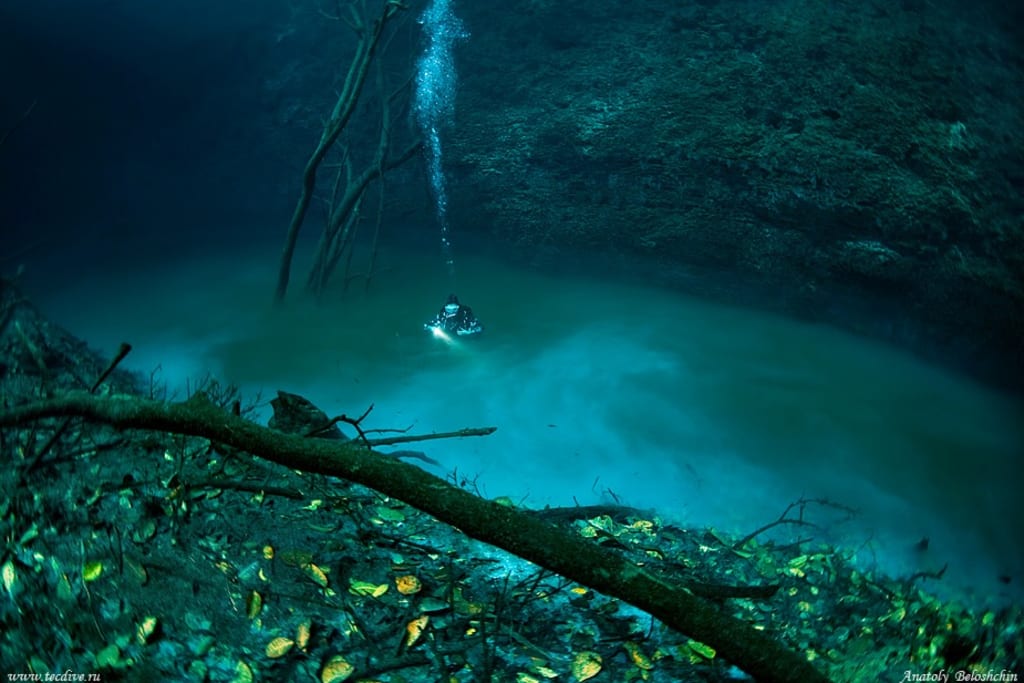UNDERWATER LAKE
Exploring the Mysterious Underwater Lake in the Gulf of Mexico

Title:
Introduction: The Gulf of Mexico is one of the largest bodies of water on Earth, covering an area of roughly 600,000 square miles. It’s home to a diverse range of marine life and is a popular destination for scuba divers and fishermen alike. But beneath the surface of the Gulf lies a mystery that has intrigued scientists and explorers for years – an underwater lake that is unlike anything else on the planet.
The toxic properties of this underwater lake can be seen in the many animals that have died within its bounds. Divers who've encountered the underwater lake have reported seeing crabs, eels, and other marine life that appear to have been suffocated by the lack of oxygen. Many animals also showed signs of severe tissue damage, likely caused by the toxic chemicals and gases present in the lake.
Despite being a dangerous and deadly presence in the Gulf of Mexico, the underwater lake also serves as a unique opportunity for scientists to study extreme ecosystems and gain a better understanding of the natural processes that occur within our oceans. Additionally, with the importance of the Gulf of Mexico's ecosystem, understanding this underwater lake's mechanisms could be critical for protecting marine life from unexpected dangers such as oil spills.
The existence of this underwater lake further reinforces the idea that there's still so much to learn about the world around us. While the dangers it poses are evident, the potential scientific discoveries and knowledge that can be gained from studying it are incredible. Let's hope that as research continues, we can develop a better understanding of how to protect our oceans' unique, complex ecosystems, and the diverse animals that call it home.
What is a Brine Pool? Before we dive into the specifics of the Gulf’s underwater lake, it’s important to understand exactly what a brine pool is.
The Gulf of Mexico’s Underwater Lake: The Gulf of Mexico’s underwater lake is one of the most famous and widely studied brine pools in the world. It’s located in an area known as the “Sigsbee Deep,” which is essentially a large depression on the ocean floor. The brine lake itself is approximately 100 feet deep and has a diameter of about 1,000 feet.
How Did the Underwater Lake Form? The formation of the underwater lake is a mystery that scientists are still trying to unravel. However, there are several theories about how it may have formed.
The Black Hole: One of the most fascinating and eerie aspects of the Gulf of Mexico’s underwater lake is its deadly nature. Known as the “Black Hole,” the lake has the ability to kill everything it touches.
The Science Behind the Danger: The underwater lake is believed to be created by a combination of brine water (water with a salt concentration greater than that of seawater) and methane gas escaping from the seafloor. The toxic properties of this underwater lake can be seen in the many animals that have died within its bounds.
The Potential for Discovery: Despite the dangers of the underwater lake, it also serves as a unique opportunity for scientists to study extreme ecosystems and gain a better understanding of the natural processes that occur within our oceans.
Conclusion: The existence of the Gulf of Mexico’s underwater lake further reinforces the idea that there's still so much to learn about the world around us. While the dangers it poses are evident, the potential scientific discoveries and knowledge that can be gained from studying it are incredible. Let's hope that as research continues, we can develop a better understanding of how to protect our oceans' unique, complex ecosystems, and the diverse animals that call it home.





Comments
There are no comments for this story
Be the first to respond and start the conversation.